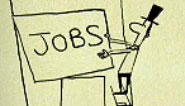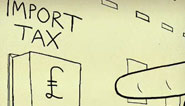Find out more about The Open University's Economics courses.
Transcript: Most countries trade with one another – which is usually pretty good for all involved – but it does mean it’s a bit harder for each to keep control of its own finances.
There are three things that governments are particularly keen on.
They like to keep the exchange rate stable so that import and export prices don’t suddenly jump around.
They also like to control interest rates so they can keep borrowers happy without upsetting savers.
And they like to let money flow in and out of their country without causing too much disruption.
But there’s a problem when you try to do all of these at once. Say for example, the Eurozone tries to lower its interest rate to boost investment and reduce unemployment.
Money flows out to earn higher interest rates elsewhere. Exchange rates drop, which causes inflation, so the Euro interest rate is forced back up again.
You can either fix your exchange rate and let money flow freely across national borders – but have no control over your interest rates.
Or control your interest and exchange rates – but then you can't stop the capital flowing in and out.
But, like an overzealous triathlete – you can’t do all three at once.
Got another 60 seconds?
-
60 second adventures in economics: The Invisible Hand
Watch now to access more details of 60 second adventures in economics: The Invisible HandIn the first of our six short videos on economic theory, watch how an Invisible Hand drives the economy. Eventually.

Video
Level: 1 Introductory
-
60 second adventures in economics: The Paradox Of Thrift
Watch now to access more details of 60 second adventures in economics: The Paradox Of ThriftIs it better to save or to spend? According to Keynes, if you don't spend, you're going to make the economy even worse. This animations explains more in just one-minute.

Video
Level: 1 Introductory
-
60 second adventures in economics: The Phillips Curve
Watch now to access more details of 60 second adventures in economics: The Phillips CurveBob Phillips took some time out of crocodile hunting to have a stab at explaining how wages, prices and unemployment interplay.

Video
Level: 1 Introductory
-
60 second adventures in economics: The Principle Of Comparative Advantage
Watch now to access more details of 60 second adventures in economics: The Principle Of Comparative AdvantageWhy do countries sign free trade agreements? It's not just because they get to keep the pens, but to try to take advantage of their comparative advantage.

Video
Level: 1 Introductory
-
60 second adventures in economics: Rational Choice Theory
Watch now to access more details of 60 second adventures in economics: Rational Choice TheoryPeople are pretty rational. But not quite rational enough for the good of the economy.

Video
Level: 1 Introductory
Got more than 60 seconds? Try these FREE courses...
-
Economics and the 2008 crisis: a Keynesian view
Learn more to access more details of Economics and the 2008 crisis: a Keynesian viewThis free course, Economics and the 2008 crisis: a Keynesian view, looks at how Keynes's theories revolutionised thinking about the causes of crises and unemployment. Keynes's thinking on how to reduce these problems was very influential with economists and policy makers for several decades following the 1930s. The economic downturn that started...

Free course
28 hours
Level: 2 Intermediate
-
Economics explains discrimination in the labour market
Learn more to access more details of Economics explains discrimination in the labour marketDiscrimination in the labour market exists in many forms: the 'glass ceiling', ageism, racism, and so on. This free course, Economics explains discrimination in the labour market, will help you look at this problem from a new perspective: through economics. You will learn how economists have tried to understand what drives this distortion of the...

Free course
8 hours
Level: 3 Advanced
-
Rent or buy? The challenge of access to housing
Learn more to access more details of Rent or buy? The challenge of access to housingEveryone needs a place they call home and housing costs are usually your largest outgoing. Many aspire to buy, but rising house prices, while good news for existing owners, put homeownership beyond the reach of others. This free course, Rent or buy? The challenge of access to housing, addresses some of the most important decisions that ...

Free course
8 hours
Level: 1 Introductory
Rate and Review
Rate this video
Review this video
Log into OpenLearn to leave reviews and join in the conversation.
Video reviews